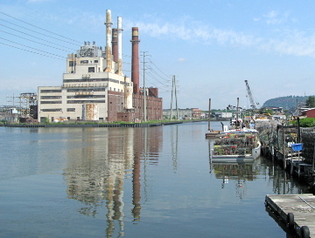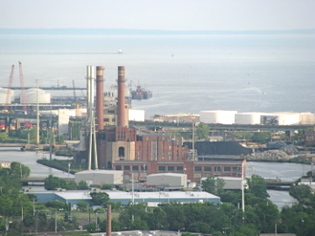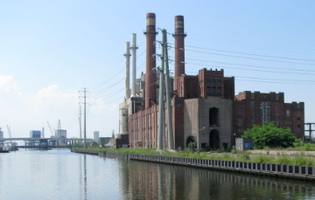

An abandoned, polluted power plant looms over Fair Haven — and over a fight between city officials and the electric company that’s leaving town. At issue: How dirty is English Station, and who should clean it up?
The plant at 510 Grand Ave. has become the latest flash point in an ongoing dispute over the United Illuminating Company’s impact on the city.
It’s one topic aldermen intend to probe at a public hearing on UI’s plan to move its corporate headquarters from downtown New Haven to an office park in Orange.
In a proposal to be introduced Monday night to the Board of Aldermen, Carl Goldfield (pictured), Roland Lemar and Moti Sandman are calling for a public hearing on the “consequences and wisdom” of UI’s relocation. They said the move flies in the face of smart growth and transit-oriented development.
Click here to read the resolution.
The bill’s proponents said UI should stay in New Haven — or at least clean up the mess it leaves behind.
The power plant, whose four smoke stacks rise high above the Fair Haven skyline, “frames the issue” of how UI has treated the city, Goldfield said Friday. He said the power plant makes visible the company’s mentality: “We’ve gotten everything we wanted from New Haven, so we’re moving to a new, clean place and we’re leaving you English Station.”
 UI replied that it has completed its obligations at the power plant: UI sold English Station in 2000 and passed off the cleanup duties to a series of subsequent owners.
UI replied that it has completed its obligations at the power plant: UI sold English Station in 2000 and passed off the cleanup duties to a series of subsequent owners.
UI spokesman Al Carbone said his company spent almost $2 million on remediation at the power plant, which occupies eight acres of land on an island in the Mill River. The obligation for the cleanup now rests with the property’s current owners, Evergreen Power LLC and Asnat Realty LLC, he said.
However, in a recent federal filing, UI admits it may still be on the hook for the cleanup if the current owners fail to get it done.
The question is, how much pollution remains?
Neither side appears to know for sure. But city officials contend that the cleanup work is not done: they classify the site as a “brownfield” — a polluted, abandoned eyesore not fit for development.
UI burned coal and oil at the power plant for 63 years, until 1992.
Alderman Lemar said he believes that after that legacy of pollution, UI has “the moral and legal responsibility” to clean up the land. UI sold it to a company that had no ability to clean it up, he argued.
His remarks echo those of Mayor John DeStefano, Jr. in a heated sidewalk confrontation in May with UI CEO Jim Torgerson and President Anthony Vallillo. DeStefano blamed the company for leaving the plant for someone else to deal with.
“You gave it to someone with no liabilities and ability to rehab it and took your profits and left a dirty site in a neighborhood where thousands of children live,” charged the mayor. (Click the play arrow to watch.)
The site lies in a neighborhood with a high concentration of Latino families and poor people. Coal-burning power plants are notorious for saddling neighbors with health problems, including asthma attacks.
DeStefano invited the UI executives at the May confrontation to “go over right now” to English Station, where he would “show you what you’re leaving to the City of New Haven.” DeStefano wasn’t taken up on the offer.
“You cut it loose,” he charged — “like you cut loose your customers and like you’re cutting loose the people who can’t access a car to get to work.”
Changing Hands
According to UI, the responsibility for the cleanup has long passed from the company’s hands.
UI built English from 1924 to 1929 and ran it until 1992, said UI’s Carbone. The plant burned coal until 1960, when it switched to residual fuel oil. In 1974, when UI built Harbor Station in the East Shore, English station became a “peaking unit,” used only during times of peak demand. In 1992, due to operational inefficiency, it was put into a “deactivated reserve.” In 1998, because of an energy restructuring act, UI was required to sell off all its energy assets, Carbone said. It transferred ownership of the plant in 2000 to an “unaffiliated” company called Quinnipiac Energy. UI paid the company $4.25 million to take the property off its hands.
 With that transfer came the obligation to clean up the site, said Carbone. As part of a state-sanctioned land deal, UI put $1.9 million, which equaled the estimate for remediation at the time, into an escrow account “for purposes of bringing soil and groundwater on the site into compliance with applicable environmental laws.”
With that transfer came the obligation to clean up the site, said Carbone. As part of a state-sanctioned land deal, UI put $1.9 million, which equaled the estimate for remediation at the time, into an escrow account “for purposes of bringing soil and groundwater on the site into compliance with applicable environmental laws.”
From that time forward, Quinnipiac Energy became the “certifying party” for the required environmental work, Carbone explained in an email. “Since the sale to QE in 2000, UI’s role was limited to verifying invoices associated with site cleanup.”
The deal was made with the expectation that Quinnipiac Energy would open a peaking plant there, said Carbone. However, that plant never reopened. Local environmentalists fought hard against the project, which they said would funnel electricity to the suburbs at the cost of low-income minorities’ health. They helped topple the proposal: In 2003 the Department of Environmental Protection denied the application for permits, citing health risks.
After that plan failed, Quinnipiac Energy sold the site to two joint owners, Evergreen Power LLC and Asnat Realty LLC in 2006. Carbone said the obligation for remediation now rests with those companies.
“Any questions about the status of the cleanup should be referred to them,” Carbone said. An Evergreen executive did not reply to cell phone messages or an email requesting comment for this story.
Still On The Hook?
While Carbone pegged the cleanup duty on the plant’s current owners, a recent filing with the Securities and Exchange Commission indicates that the company believes it may still be on the hook.
“UI could be required by applicable environmental laws to finish remediating any subsurface contamination at the site if it is determined that QE and/or Evergreen Power and Asnat have not completed the appropriate environmental remediation at the site,” reads an SEC report filed in May by UI’s parent company, UIL Holdings.
Despite that possibility, UI has stopped listing the English Station cleanup as a liability.
That’s because UI has paid out nearly all of the $1.9 million fund that was designated for the task, said Carbone. Over the years, UI drew from that account to reimburse subsequent English Station owners for remediation work. The most recent reimbursement came in July 2008, to Evergreen and Asnat. As of March 31 of this year, the fund had shrunk to $100,000, and UI stopped reporting the cleanup as a liability on federal SEC reports.
As the fund dwindled over the years, one observer wondered where the money was going, as it didn’t appear that the cleanup was getting done.
How much pollution remains?
A state Department of Environmental Protection spokesman said he didn’t have a recent estimate.
Neither does UI, according to its SEC filing. The company is “unaware of what agreement was reached between QE and Evergreen Power and Asnat regarding future environmental liability or what remediation activity remains to be undertaken at the site.”
The city doesn’t know either, said City Plan Director Karyn Gilvarg: “We are aware of the need for remediation, but not of the extent or magnitude.”
Lemar said a 2002 estimate pegged the cleanup at around $6 million.
“I haven’t seen anything up-to-date,” he said, “but I doubt that it is a saleable, marketable, clean site.” He said UI should return the property to a presentable state.
“Before they leave, I hope they do clean that site and ensure we have a clean and marketable site that can attract new development, or attract good, meaningful reuse.”
The Lineup
The aldermanic hearing, proposed to be held in September, aims to ratchet up the pressure on UI on a number of issues related to the move. Goldfield, Lemar and Sandman have been outspoken opponents of the electric company. In a January proposal, they blasted UI for its flight to the suburbs and proposed rate hikes, and suggested creating a public utility so New Haven can cut loose from the electric company’s grip. No action has been taken on that bill.
With the latest proposal, aldermen plan to create a “broad discussion” among “UI ratepayers, UI shareholders, local businesses, environmental and business organizations, public officials,” and anyone else who wants to weigh in on the “consequences and wisdom” of UI’s move.
Up for discussion: How much will the move cost; who will pay for it; and its impact on downtown businesses, the environment, and transportation infrastructure.
Lemar said they plan to invite (but not subpoena) UI’s Torgerson and other UI officials to the hearing. The state of English Station will be one issue the executives will be asked to answer to if they agree to be grilled.
“They’ve essentially abandoned the city — left us with English Station and an big environmental mess out there in Fair Haven, and now they’re abandoning the city from the service side,” said Goldfield, the board’s president.
“I think they should be pressured to stay in the city, and I think they should be pressured to take on the responsibility of cleaning up the site,” Goldfield said.
Carbone said Friday that the company had not received an invitation to the hearing.
“If they make a formal request, we’re going to respond to it,” he said.













I'm not a big fan of Goldfield, but THANK YOU! I love Lemar and Sandman, and I'm not surprised that they are pushing this for us. We should not have to pay for UI's move to Orange while also being left with the remnants of their dirty business activities here in New Haven.